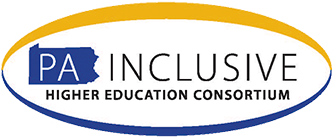Pennsylvania Inclusive Higher Education Consortium (PIHEC) is funded by the U.S. Department of Education through the acquisition of a Transition and Postsecondary Programs for Students with Intellectual Disabilities (TPSID) grant. The administration of the grant is being achieved through Millersville University under the direction of Thomas Neuville, Ph.D., principal investigator, and Ann Marie Licata, Ph.D., serving as the co-principal investigator. The administration of PIHEC is being achieved under the direction of the five model initiatives: Duquesne University (2022), Gwynedd Mercy University (2025), Lock Haven University (2024), Millersville University(2021), Temple University (2023).
The purpose of PIHEC is to strengthen and share the leadership of the statewide Consortium, guided by the vision to design and provide an inclusive and supportive higher education climate. The Consortium membership will, given available resources, grow to 100 institutions of higher education. The membership collectively aims to admit 1000 students with ID.
The Consortium’s strategic objectives are :
- Raising awareness and increasing expectation for people with intellectual disability
- Identifying “Champions”
- Foundations and Structure of Consortium
- Building Diverse and influential membership
- Seeking and building a community of partners
- Safeguard the fidelity to the integrity of Culturally Valued Analogue
- Reflective practice with change
The Consortium’s goals are to:
1) Further develop and refine five state-of-the-art, research-based, fully inclusive postsecondary programs of study at Duquesne University, Gwynedd Mercy University, Lock Haven University, Millersville University, and Temple University, with the following activities;
• Refining state of the art, research-based, fully inclusive postsecondary programs
• Sharing knowledge across organizational boundaries necessary to institute change present in the establishment of new inclusive postsecondary programs
• Focusing upon sustainable financial and cultural expansion.
2) Build upon the efforts of recent collaborations with the Office of Vocational Rehabilitation, Office of Developmental Programs, and the Pennsylvania Department of Education with the following activities;
• Securing and increasing funding on a “per person basis” for university/college tuition and fees for students with ID, inclusive of Medicaid waivers
• Attaining statewide Comprehensive Transition Programs (CTP) designation as a qualifier for meaningful certification and accreditation
• Including Think College standards and accreditation as state policy for funding and certification.
3) Partner with PK-12 Local Education Agencies (LEAs) within and in proximity to Qualified Opportunity Zones (QOZs), with the following activities;
• Developing partnerships with PK-12 LEAs within and in proximity to QOZs
• Creating citizen and professional action committees known as Employment Community Collaboratives based in identified QOZs.
4) Serve as an organization of people and programs with a common purpose and formal associational and shared leadership providing technical assistance to existing and emergent postsecondary programs across the Commonwealth, with the following activities;
• Developing the Consortium as a participatory action association with shared leadership
• Developing a request for proposals for IHEs to receive specific and targeted training and technical assistance for the development of new programs and the sustainability of existing programs
• Cultivating Consortium membership to 100 members.
PIHEC Mission:
The Pennsylvania Inclusive Higher Education Consortium (PIHEC) creates fully inclusive opportunities for students who have historically not had access to post-secondary educational opportunities. The consortium provides consultation and technical assistance for diverse communities to sustain institutions of higher education (IHE) in developing accessible inclusive higher education opportunities for young people with intellectual and developmental disabilities.
PIHEC Vision:
To design and support postsecondary campus settings in which education, authentic social experiences, independent living, and integrated and competitive employment can be accessed by young adults with intellectual disability within inclusive and supportive environments.
